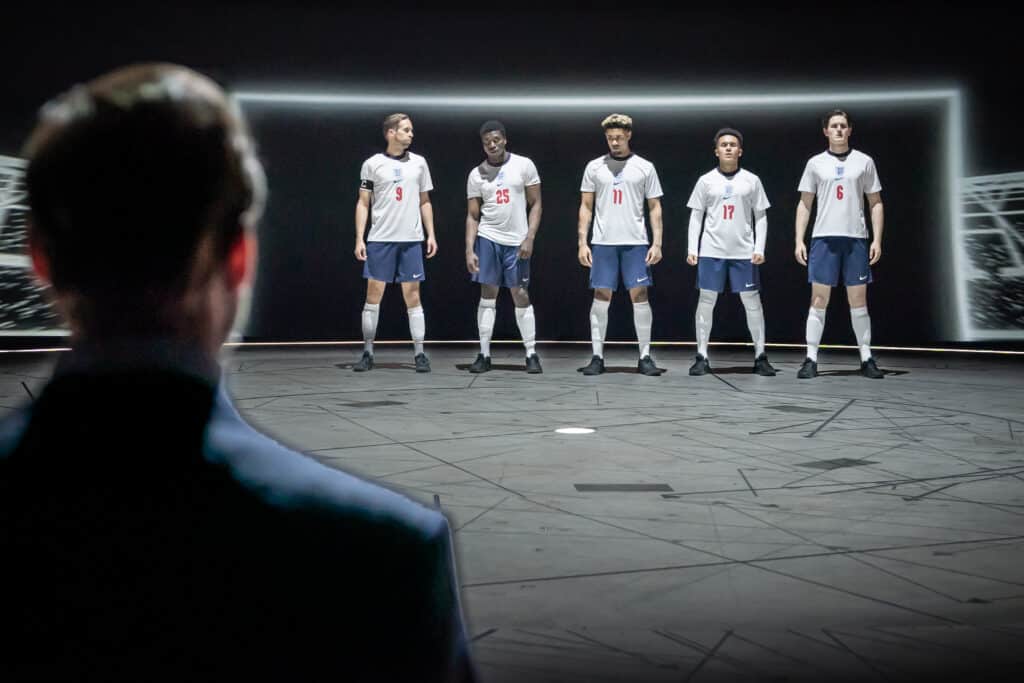Interview

Interview
James Graham: “I consider Gareth Southgate a playwright”
As the National Theatre smash transfers to the West End, the Dear England writer discusses the dramatic arc of the England manager
The penalty kick might be football’s finest piece of theatre. Of course, the sport is made up of an ensemble cast, collaborating in a choreographed and much-practiced routine set by a director, who awaits in the stands each night with a new set of notes on how to improve.
But the penalty is the soliloquy; the only moment in the game where the crowd is brought to complete silence as a player steps into the limelight and hopes to shift the narrative arc in their favour.
The links between drama and football are deep rooted; there’s a reason Old Trafford, for instance, is called the Theatre of Dreams. But it’s the penalty’s gut-punch of a gamble between heartbreak or victory, separated by such fine margins, that ignited James Graham’s imagination when he came to write Dear England – this summer’s National Theatre hit that is now playing away in the West End.
“It’s football at its most elementary,” says Graham. “I think it is a distillation of The Beautiful Game, and one of the most theatrical, dramatic moments you can experience is a World Cup knockout game where these lads march up to that ball and face that goalkeeper while the world is watching. It’s the cruelest, most absurd and probably stupidest way to end the game, but no one’s come up with a better one.”

Few will understand how cruel a miss can really be than England manager Gareth Southgate, who ended his country’s promising run at the 1996 European Championship with a nervous kick of the ball, straight into the gloves of Germany’s keeper Andreas Köpke.
Southgate is not the only English footballer to have met this fate; despite inventing it, England hadn’t won a penalty shootout until 2018. But his reckoning of that moment as a young lad in front of goal frames Graham’s play, as he leads and reshapes a new generation of young men in an effort to break this curse and aim for victory. “This is a story,” says Joseph Fiennes as Southgate to his players, “and you are the storytellers”.

Dear England is a story of three parts: beginning at the 2018 Russia World Cup when Eric Dier and his teammates helped the team finally break the penalty curse to reach the semi-finals; then the 2020 Euros where, ahead of schedule, England came within touching distance of glory before missing out to Italy in a shootout; and ending at the 2022 Qatar World Cup, where the nation truly believed that football was coming home.
This is not just Graham’s structure as a dramatist, but Southgate’s own plan – one that we see Fiennes explain to his History Boys-esque ensemble of cheeky but endearing young footballers, attempting to reference the building blocks of Shakespeare, before resorting to Star Wars. It’s a neat piece of meta-theatre that sets out the plot while giving us a glimpse of how the culture and mindset behind the team began to change when Southgate took charge in 2016. But the real manager acted like a creative consultant to the play, urging Graham to consider the narrative this way when he was first approached about the idea. Southgate’s journey was a tripartite vision, culminating in Qatar.
“I consider him to be almost a playwright,” says Graham. “He’s a storyteller. He uses that language all of the time and so do his players now – they talk about trying to tell stories, to create memories, to try and own the narrative. And I think in a way, the English disease in football is always wanting results immediately, rather than putting in the effort over a longer period of time like the Germans did in the early 2000s. We always want it immediately, so I think Gareth and his team’s suggestion to me to make it in three parts, and to take my time with it, is because inherent in the structure is one of the problems with the English game.”

Needless to say, England did not win at the Qatar World Cup – with a missed penalty from the team’s greatest goalscorer, Harry Kane, scuppering a chance to better the French team and reach the semi-finals. This match filled the whole nation with nerves as they watched from pubs or public screenings, but surely there was another dimension of anxiety for Graham as he waited to see how the result would shape his play (that had already been commissioned and scheduled)?
“There was a part of me absolutely sh*tting it,” he says. “I’ve promised this play and what if the ending just isn’t as exciting or good as it needs to be? What if it doesn’t say anything about this Southgate experiment? On that quarter-final, I was the only one watching in the pub with two hats on; I just wanted us to win, and then as a dramatist, if we didn’t win I needed it to be really interesting and say something about this quiet revolution that Southgate has undertaken.
“But of course, it only took a few minutes of thinking to realise the tragedy of Harry Kane repeating the fate of his mentor – his father figure in the form of Gareth – not quite in the same circumstances, but still losing on a penalty. The guy who never misses the penalty is the one who returns to that trauma of the English game.”
Dear England is not, then, a play about winning, but rather about how a new coach that many doubted reshaped the philosophy and psychology behind a team of players. And how, in turn, they recast the nation’s attitude from the pits to pride. The play fits a lot into its three-hour runtime, probably a little too much at times – as the story develops alongside changing prime ministers, Brexit, the Black Lives Matter protests and the pandemic – but the actors’ caricature likelinesses and close impressions help us keep pace. Will Close’s emotionally thawing Harry Kane and Josh Barrow’s brash and head-bumping Jordan Pickford are particular highlights, while Fiennes’ Southgate is uncanny. Griffin Stevens looks a little more like John Stones than Harry Maguire, but does well to convey Southgate’s consistent admiration for him.
Changing public opinion comes from a fast-moving ensemble – from clergymen and graffiti artists to pundits including Alex Scott and Gary Lineker. But to help steer the team away from the confines of inherited grief, as well as the oppressive sense of masculinity that has long haunted sport, Graham was eager to emphasise the importance of psychologist Pippa Grange, played by Dervla Kirwan. In the second act the tempo is turned down a notch and we see Grange and Southgate’s rapport with Kane, Marcus Rashford (Darragh Hand) and Raheem Sterling (Kel Matsena) gain “the confidence to stand up for their teammates and the things that matter to them as people,” as Southgate put in his 2020 open letter that gives the play its name.
“I have never believed that we should just stick to football,” the manager’s letter continued. This will seem especially poignant to audiences in the coming weeks as the football community continues to garner greater expectation to pick a stance on global issues. But, Dear England’s biggest strength is its portrayal of how, in a time of unprecedented political unrest and social polarisation, Great Britain could unite in their faith in a new wave of decent young men and role models – whether they win a penalty shootout or not.
Dear England plays at the Prince Edward’s Theatre, London, until January 2024 – find tickets here









